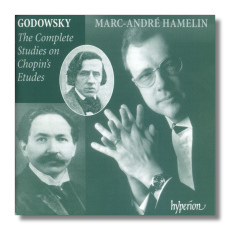
The Internet's Premier Classical Music Source
Related Links
- Latest Reviews
- More Reviews
-
By Composer
-
Collections
DVD & Blu-ray
Books
Concert Reviews
Articles/Interviews
Software
Audio
Search Amazon
Recommended Links
Site News
 CD Review
CD Review
Leopold Godowsky

The Complete Studies on Chopin's Études
- 54 Studies on Chopin's Études
Marc-André Hamelin, piano
Hyperion CDA67411/2 2CDs DDD 153:02
Those of us who enjoy older recordings, originally on 78s, are well aware that ultimate fidelity to the text was not always considered a necessary attribute of great playing. Many pianists from the "Golden Age" were particularly fond of "improving" Chopin by, for example, playing tricky passages in thirds (Josef Hoffman's 1930s recording of the "Minute" Waltz is a good example).
Few, however, went anything like as far as Leopold Godowsky (1870-1938) whose 53 Studies on the Études of Chopin have received a fair amount of bad press over the years, mainly through a misunderstanding (possibly wilful) of Godowsky's intentions.
Godowsky was not attempting to improve Chopin's Études, but to use them as the basis for creating over fifty monumentally difficult studies, designed to serve the same purpose: to help improve technique, but to do it with musically worthwhile material.
Richard Wagner described Chopin as "a composer for the right hand" and Godowsky would probably have agreed with him. Which is doubtless the reason why no fewer than 22 of them are for the left hand alone – including the transcription of the famous Revolutionary Étude. (This was the first significant body of left-hand piano music and Ravel studied it extensively while composing his Concerto).
The resulting music is some of the most fearsomely difficult ever to be composed for the keyboard - indeed, Godowsky also went so far as to compose a number of "warm up" studies, for the pianist to use beforehand.
More importantly, though, Godowsky did not just produce "parlour tricks" or "prettified" version of Chopin, but used his Études as a starting-point for some truly remarkable music.
Many of the studies are fairly straight transcriptions, particularly the left hand ones, but most of them either add extra subjects in counterpoint, transpose the function of the hands in the original - as in the first of all, a majestic reworking of Op. 10 #1 with the right hand arpeggios given to the left hand - or emphasise rhythmic features in subtle or not-so-subtle fashion.
Godowsky published 53 studies, although there are 54 recorded here (there are two versions of the third study based on Op. 25 No.2). Obviously a number of the originals feature more than once (and one, Op. 25 #7 doesn't appear at all), but Godowsky really let himself go with the famous Butterfly Étude, Op. 10 #5, which inspired no few than seven studies, including, of course, a left hand version.
Op. 10 #5 also features in possibly the most remarkable of all the studies, #47, "Badinage", which combines it with the other G flat Étude, Op. 25 #9 (the Black Key) in a tour-de-force both compositionally and technically.
Marc-André Hamelin has recorded several of the studies before (on a CBC Musica Viva disc) but this new complete recording supersedes that rather murkily-recorded disc in every way.
Hamelin is, of course, one of the very few living pianists with the technique to play this music as it should be played: fluently, so that the listener is scarcely aware of the hideous demands imposed on the performer.
Not only does Hamelin have the "chops" he has been including various of the studies in his recitals (both programmed and as encores) for years now and it shows.
I suppose this music is not for everybody; there will undoubtedly be those whose first, second and indeed last reaction will be "sacrilege!". So be it.
A simple experiment, though, will suffice: listen to to Hamelin's performances of the first two studies (both based on Op. 10 #1): the titanic first and the delicate, filigree-like second. If you are indifferent (or worse, offended), then this music is not for you.
But for anyone who can break out of the "purist" mentality, this set contains some simply magnificent pianism and reveals Godowsky's studies to be worthy of performance in their own right as wonderfmusic.
This is the third complete set to appear on record. Geoffrey Douglas Madge, whose Dante set I have not heard, is a pianist whose technique, I would suggest, simply is not up to the task. Certainly on the basis of his dismal Busoni set recorded for Philips some 15 years ago, I would avoid him. Assuming you can find it that is: I don't recall ever even seeing his recording.
Carlo Grante's set on Altarus (what I've heard of it) is very good, and perhaps slightly better recorded than Hamelin's, but comes on three rather than two discs, and is also harder to find. Nor does Grante seem to have quite the same facility with the music; true, there is no sense that he is struggling, but he still doesn't sound sufficiently at ease to add much interpretively. Or perhaps he recorded them too soon.
Hamelin's may not be the only way to play these studies but, until a pianist with a similarly transcendental technique and equal musicianship records them - and that, I'd suggest, could be some considerable time - this is without doubt the set to have.
Copyright © 2000, Deryk Barker


















